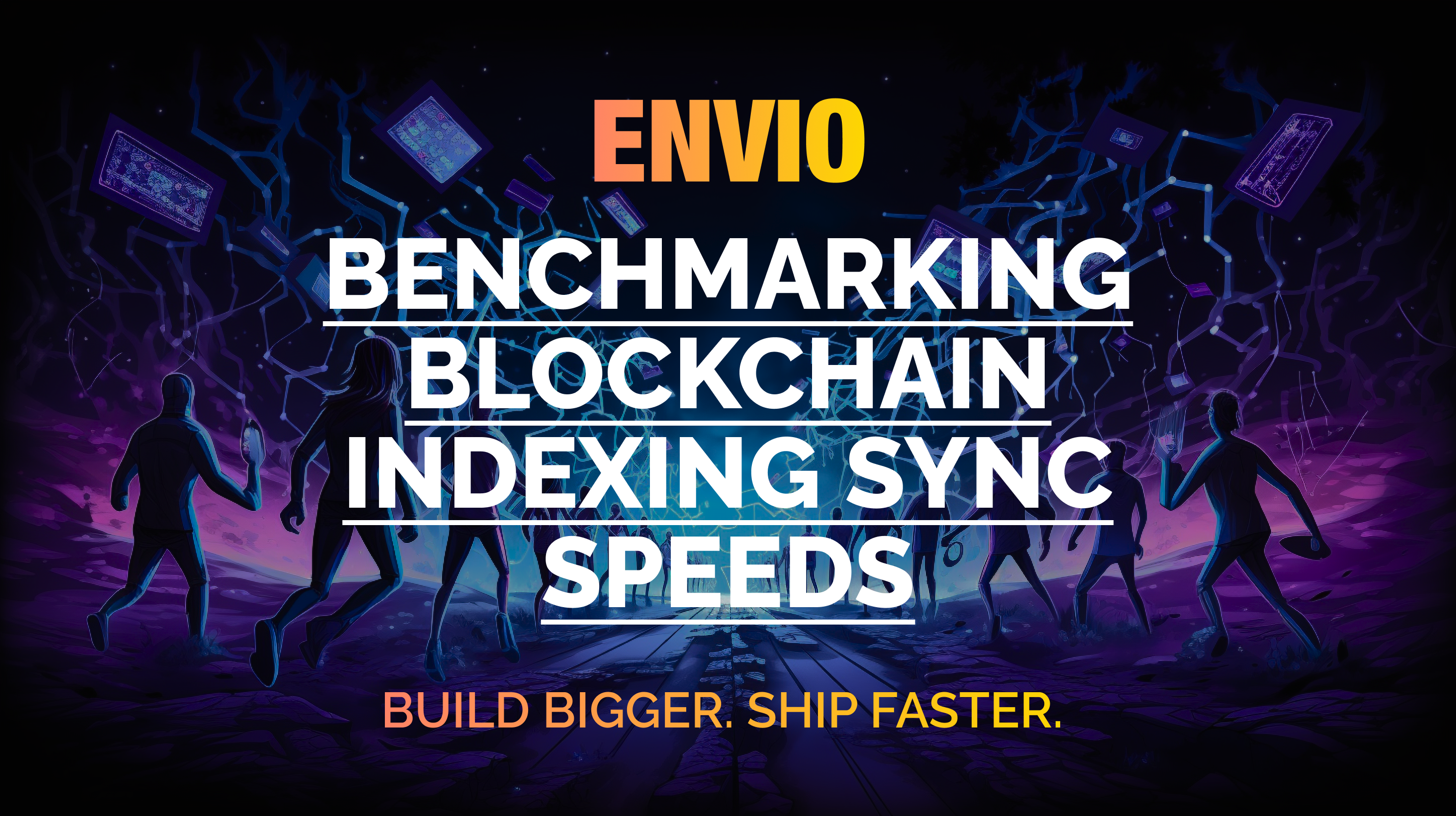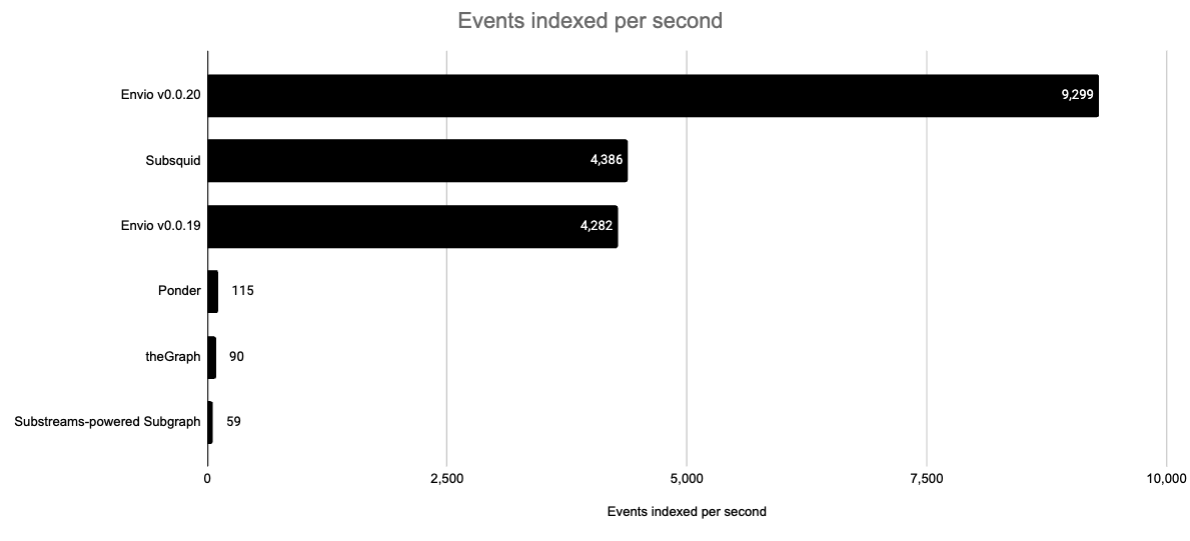Benchmarking Blockchain Indexer Sync Speeds

This blog article presents the findings from benchmarking tests conducted at Envio to assess the syncing performance of various blockchain indexing solutions. At Envio, our goal is to develop a high-performance blockchain indexing solution, and we believe that validating this goal through a rigorous data-driven approach is essential. Sync speed simply put, is how long it takes for an indexer to catch up to the head of the blockchain using a historical block as a starting point.
Why is indexing speed important?
Indexing speed is important because it inherently creates a friction to deploy, debug and iterate on newer versions of the indexer. The longer the total sync time, the longer it takes to innovate and resolve issues on existing deployments.
In summary, we indexed the Uniswap V3 ETH-USDC pool contract on Ethereum Mainnet, starting from its deployment block. This specific smart contract was chosen due to its high event density, providing an ideal testbed for evaluating indexing performance in a high event-density context.
You can review the smart contract on Etherscan.
Methodology
To ensure that the sync speeds from different blockchain indexers were as comparable as possible, we ensured that the configurations of all indexers for different solutions were identical. This included:
- Indexing from the same start block for all indexers (12,376,729 - the deployment block for the contract) until the end block at the time of experimentation (18,342,024), with an approximate total of 5,395,050 raw events indexed (0.9044 events per block).
- Employing the same schema (outlined below).
- Specifying identical event handling logic (explained further).
Schema screenshot
The schema used for all indexers during benchmarking was defined as follows:
type Swap {
id: Bytes!
sender: Bytes! # address
recipient: Bytes! # address
amount0: BigInt! # int256
amount1: BigInt! # int256
sqrtPriceX96: BigInt! # uint160
liquidity: BigInt! # uint128
tick: Int! # int24
blockNumber: BigInt!
blockTimestamp: BigInt!
transactionHash: Bytes!
}
Event handler logic
For this initial iteration, the event handling logic was kept straightforward and lightweight. Indexers would listen to the Swap event emitted by the smart contract and append the details of each swap to the Swap entity table defined in the schema.
Blockchain Indexers Used
We employed 6 separate blockchain indexing solutions for this benchmarking test:
- Envio
- v0.0.20
- v0.0.19
- Subsquid
- Subgraph on theGraph hosted solution
- Ponder
- Subtreams-powered Subgraph on theGraph hosted solution
Benchmark Repositories
To ensure transparency and reproducibility, we've made the code for each indexer implementation publicly available:
- Envio: uniV3-swaps
- Ponder: univ3-ponder
- Subsquid: univ3-sqd
- Subtreams-powered Subgraph: univ3-substreams
We encourage the community to review, test, and provide feedback on these implementations. These benchmarks are also somewhat old now [edit 10 months later], we will be updating them soon with the latest versions of each indexer and on a more complicated scenario.
Findings
Below is a the results from the benchmarking tests, measured in number of events indexed per second:

Total sync times (minutes) per indexer are outlined in the table below, sorted from quickest to slowest:
| Indexer | Total sync time (minute) |
|---|---|
| Envio v0.0.20 | 9.67 |
| Subsquid | 20.50 |
| Envio v0.0.19 | 21 |
| Ponder | 780.37 |
| theGraph | 1,000 |
| Substreams-powered Subgraph | 1,529.33 |
Key takeaways:
- Envio v0.0.20 ranked the fastest at indexing out of all the blockchain indexing solutions used
- 2.12 times faster than Subsquid
- 2.17 times faster than Envio v0.0.19
- 80.6 times faster than Ponder
- 103.24 times faster than theGraph
- 157.72 times faster than Substreams-powered subgraph
Disclaimer: This indexing performance is specific to the Uniswap V3 ETH-USDC pool scenario that was used across all deployments of indexers. The relative performance of different indexers will differ according to the scenario.
Caveats
It is essential to consider certain caveats while interpreting these results:
- Versions of Envio and Subsquid were run on local machines, while the subgraphs were deployed on a hosted service, introducing potential variations.
- Ponder was deployed onto a virtual machine with 4GB of memory and 80GB disk space.
- Ponder indexing performance was extrapolated based on initial indexing progress when syncing historical blocks.
What Next?
The logical progression from this benchmarking exercise is to measure the relative syncing times of different blockchain indexers across various scenarios.
Variations including but not limited to:
- Number of contracts and events being indexed
- Event density per block
- Number and complexity of entities in the schema
- Complexity of logic in the event handlers, including loading and updating of existing entities
Different blockchain indexers may excel under different scenarios, making them more suitable for specific use cases. We encourage our users to suggest new ideas and build out scenarios for future benchmarking.
Conclusion
In conclusion, this blog article provides a data-driven analysis of the comparative performance of various blockchain indexing solutions. The results clearly demonstrate Envio's competitive edge in terms of syncing speed over the alternative indexing solutions. As we continue our journey in the web3 space, we remain committed to delivering the best possible solutions for blockchain developers.
We remain devoted to finding data-driven results and comparisons at Envio, and encourage others to benchmark Envio's performance going forward.
About Envio
Envio is a fast, developer-friendly blockchain indexer and the fastest, most flexible way to get on-chain data, making real-time data accessible for developers across the Web3 ecosystem.
With Envio, developers can query and stream blockchain data efficiently without the complexity of running their own infrastructure. Envio’s blockchain indexing tools supports any EVM network and is trusted by many teams building everything from DeFi platforms to analytics dashboards and production applications.
If you’re a blockchain developer or analyst looking to enhance your workflow, look no further. Join our growing community of Web3 builders and explore our docs.